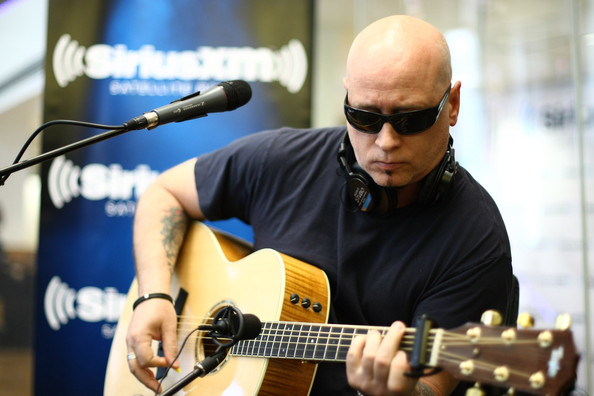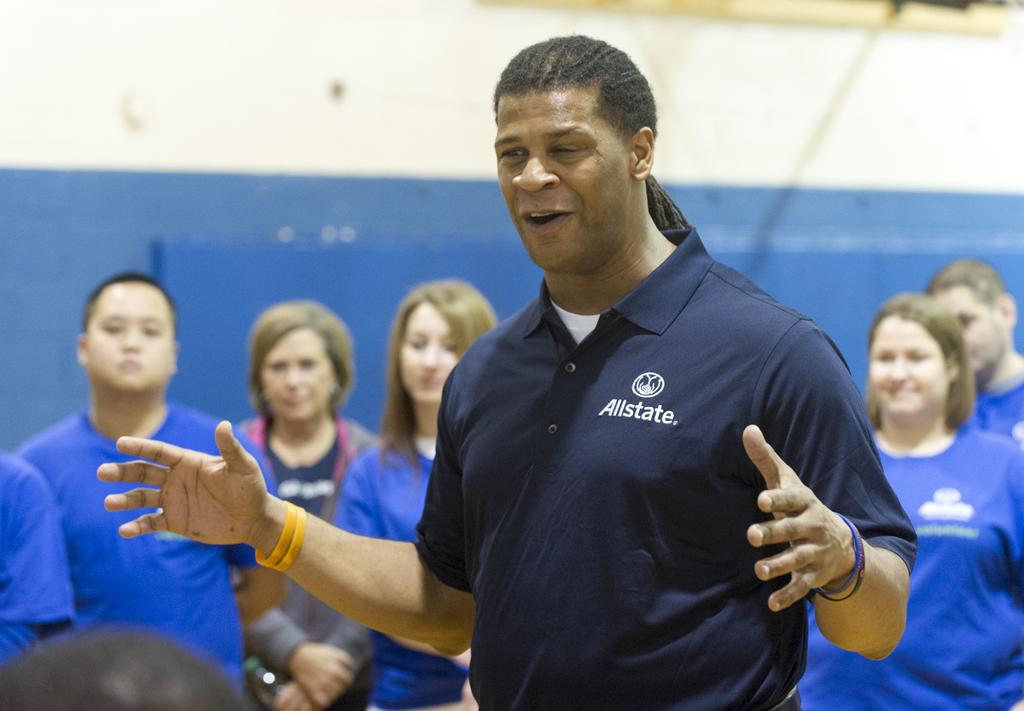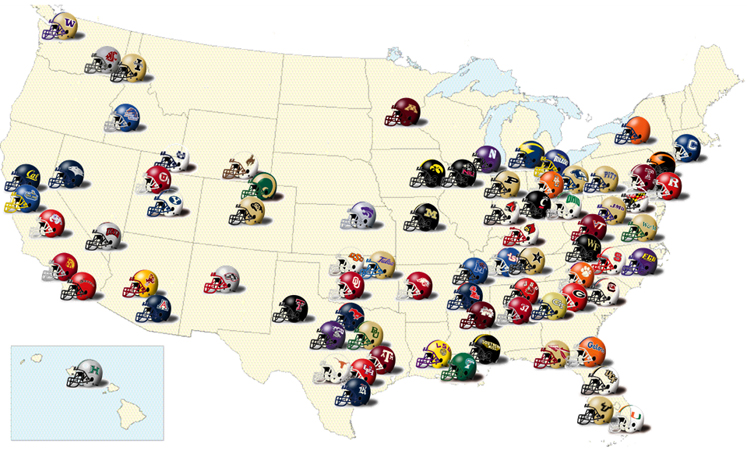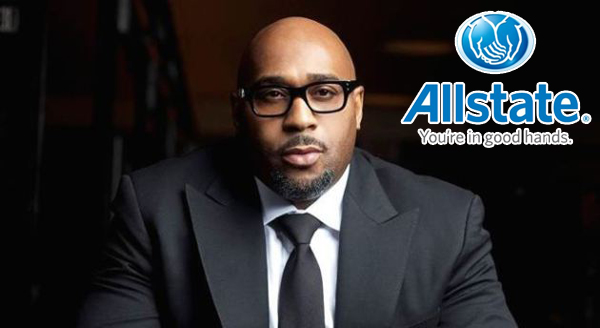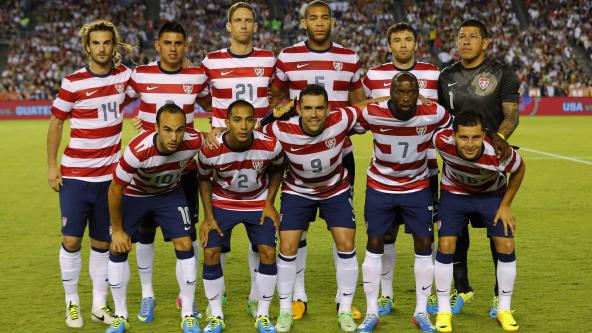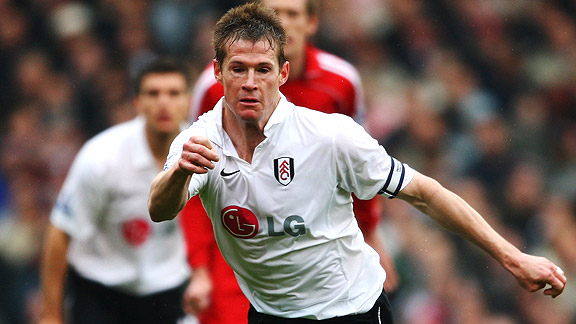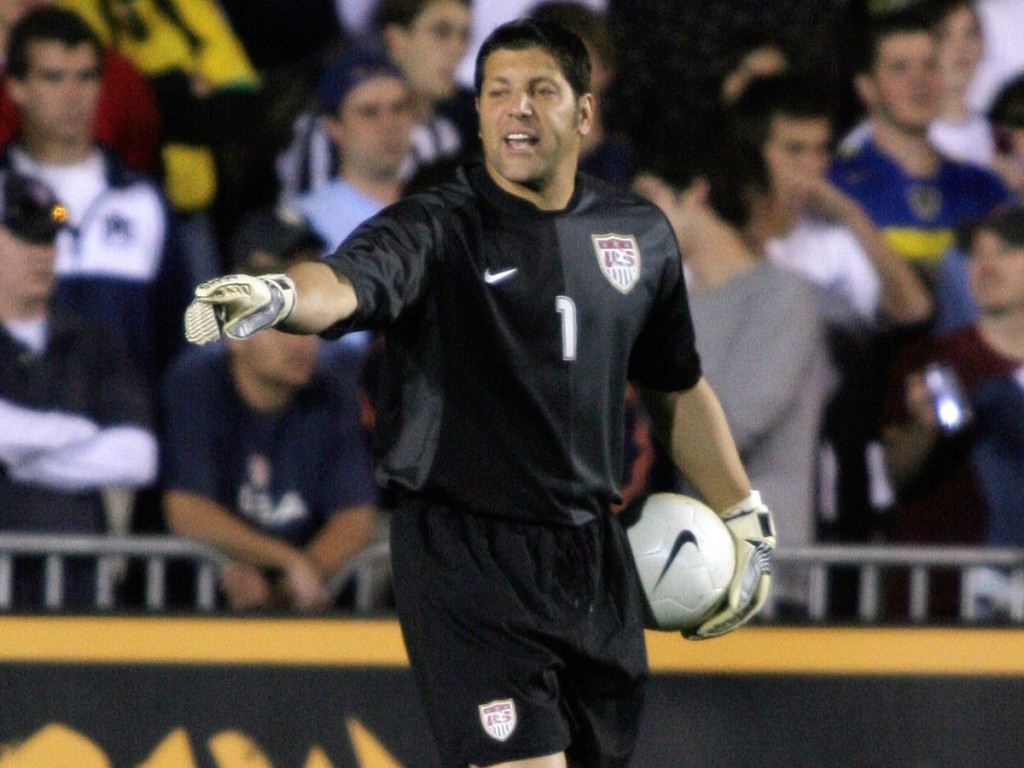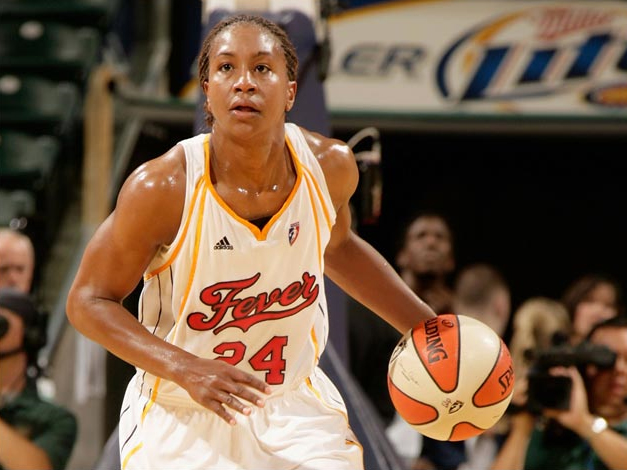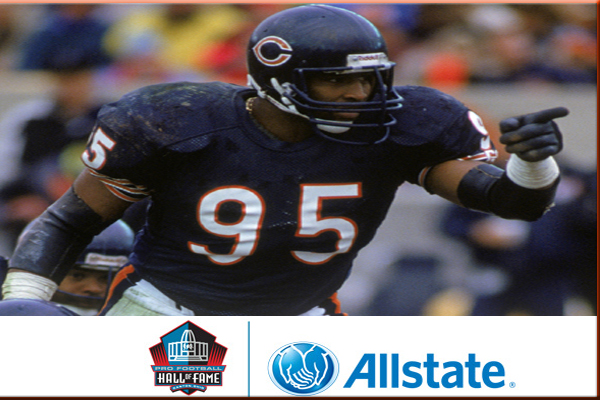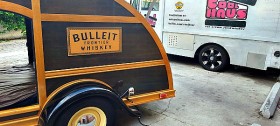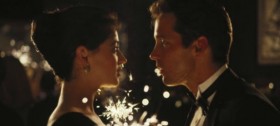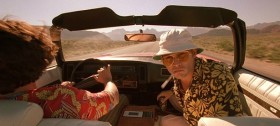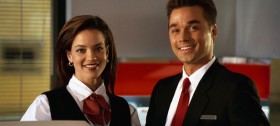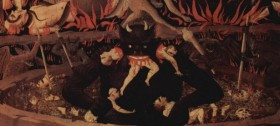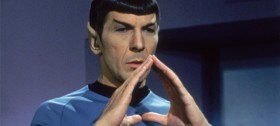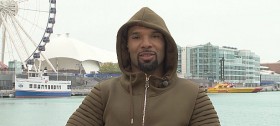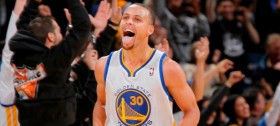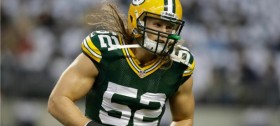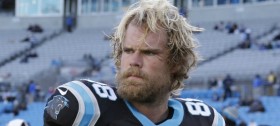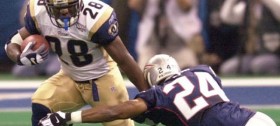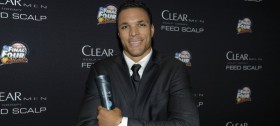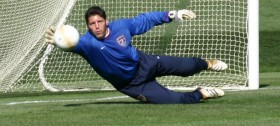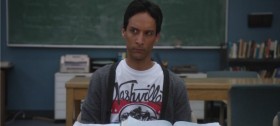Posts tagged Allstate

Train’s Jimmy Stafford Talks Music, Football, The Free Concert At The Allstate Sugar Bowl
On the heels of their seventh studio album and first new album in two years, Train will be headlining a free show in New Orleans on December 31 prior to the 2015 College Football Playoff Semifinal at the Allstate Sugar Bowl.
Train has a rich musical legacy including the hits “Meet Virginia”, “Drops of Jupiter (Tell Me)” and “Hey, Soul Sister.”
I was able to chat with Train’s lead guitarist Jimmy Stafford on the free concert he and his band mates will be performing at on December 31st that is courtesy of Allstate. We also talk about his band, coming up with songs, football and more.
If you are in New Orleans make sure you stop by the Jax Brewery Parking Lot (418 North Peters Street) at 6:15 p.m. on New Year’s Eve to check out the free Train concert.
Dec 19th

Cecil Martin & Allstate Team Up To Help Out The Youth
Cecil Martin, a former fullback from the University of Wisconsin and played some time in the NFL. He now works for Sky Sports as an analyst. Martin is a two-time member of the Allstate American Football Coaches Association (AFCA) Good Works Team, one of college football’s most prestigious off-the-field honors, for his commitment to volunteerism and serving others.
He is working with Allstate and the Indy Parks and Recreation for the Allstate Big Ten Good Works Day. It is the third annual community service initiative featuring volunteers from Allstate and Martin supporting the Indianapolis community ahead of the Big Ten Football Championship Game.
Martin, alongside a team of Allstate volunteers will help refurbish Indianapolis’ historic Douglass Park, a popular site for community gatherings and athletic events. In addition to the refurbishments, a local youth football team who uses the facilities will be surprised with new uniforms and the chance to participate in an exciting football activity led by the former football legend.
As a former Allstate AFCA Good Works Team member, Martin will also speak to the players about the importance of building character through teamwork and community service.
When I spoke with Cecil this morning I knew he was a great guy. He has enthusiasm as well as a big heart. His passion for helping others is just as big as his love for football. Here is my interview with Cecil. For more on the good work Cecil and others do with Allstate click here.
Art Eddy: Let’s talk about the good work you are doing with Allstate. It looks like you, Allstate and some volunteers are looking to refurbish a park. How did you connect with Allstate to work on this project?
Cecil Martin: You know Art it started back in college when I earned the Allstate Good Works Team award for community service. Basically every year they choose a handful of players from all over the country to be considered. I won this award two years in a row. They continue to do these programs even with the Big Ten Championship.
Now they have the Allstate Big Ten Good Works Day in conjunction with the Big Ten Championship. Every year we think about how we can give back to the community here in Indianapolis. This year we are refurbishing a park where some of these kids play. It is Douglass Park. We are going to do a bunch of football drills with one of the teams here. Then 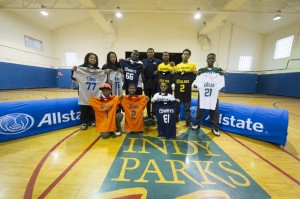 in the end we are going to unveil the refurbished park and hand all the kids in the inner city youth league new jerseys and new uniforms. Let me tell you Art it is going to be a great day.
in the end we are going to unveil the refurbished park and hand all the kids in the inner city youth league new jerseys and new uniforms. Let me tell you Art it is going to be a great day.
AE: That is fantastic. Well done! What advice can you give to people on ways that they can help out their community?
CM: I think that the biggest thing that I would say is that there are always organizations out there that need help. Anytime an organization or a group of people need help is when you should look to help out your community. Companies like Allstate or places like the Indy Parks and Recreation were they provide a place for kids to be safe are areas where helping out goes a long way.
Anytime you are able to be positive and productive I would say do it. Look into the most basic things that kids need and see if those areas need improvement. Once you see what needs work go and help those places out.
AE: What are some of the things that you have learned from football and used it to help those in the community?
CM: Wow. Wow, Art that is great question. Giving back became something that was very important to me. I earned a National Community Service Award from the President of the United States because I started up a new public service group when I was in high school.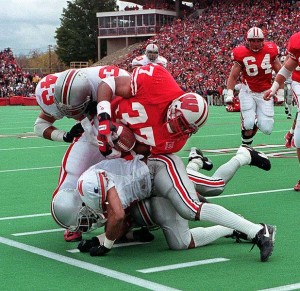
AE: Wow! That is great. Congrats.
CM: Thanks. For me there were people that looked to help me so I wanted to return the favor in many ways. When I look at football and what it has done for I would first say that it is like any other organization. You are talking about the ability of working with a team. You have people in any organization understanding what their role is. You also let the passion of that group’s goal motivate and fuel them up to get the job done.
In this case I have a role. Allstate has a role. The Indy Parks and Recreation has a role. Today we are all one big team. That is what is happening at the Big Ten Championship. You have two teams looking to each work as a team and accomplish the goal of winning the game.
AE: Speaking of that game what do you think of Wisconsin’s chances of beating Ohio State this Saturday?
CM: There is a great chance. Even though others might not think so, I feel Wisconsin has a great chance. I know that Urban Meyer has been there three years and he is making a difference coaching there. The team has won about 22 games straight. They never lost to the Big Ten. They are a powerhouse type of a team.
Now when you look at Wisconsin Badgers and see what Melvin Gordon is able to do. He is over 2,000 yards this year. He makes the offense a threat. Then I look at their defense. They are in the top ten in defense. So if you look at the defense of Wisconsin and the offense of Ohio State you are looking at a great matchup. They matchup very well if Wisconsin is playing their best ball. Plus with Ohio State playing their third string quarterback we need to make sure that he doesn’t have his coming out party. (Both laugh.)
AE: No doubt. You have played in the some big games in your college career. I think you are going to say The Rose Bowl, but do you have a game that stands out more than the others?
CM: Well we snapped Penn State’s winning streak which was impressive, but I will have to say the Rose Bowl. I was the captain of that team. People didn’t think we had a chance to win that game. We did and we proved the doubters wrong. We won 38 to 31.
AE: Do you like the new College Football Championship system that the NCAA has created for this year?
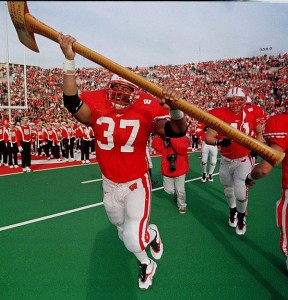 CM: I do. I think that with changing times you need to keep up with them. There is still that feeling of a bowl system, which I like. I like what the NCAA, the coaches, and the committee is looking to accomplish.
CM: I do. I think that with changing times you need to keep up with them. There is still that feeling of a bowl system, which I like. I like what the NCAA, the coaches, and the committee is looking to accomplish.
AE: You played in the NFL for a few teams. What did you take away from your time in the league?
CM: I would say that impact and the influence that you can have with young people or the community. I got to play football for living. I hope that I was able to motivate or inspire a young person. I think even then I got learn more about what it means to be humble while I was playing in the NFL. Plus to use that influence in any positive way you can.
AE: Finally who do you got playing in the Super Bowl this year?
CM: Who is going to the Super Bowl? That is a tough one. You dropped a bomb on me with that one. (Both laugh.) It is interesting because in the beginning I was thinking Seattle. Now it looks like the Green Bay Packers are the front runners in the NFC. In the AFC even though they lost to the Packers I would still say it has to be the Patriots. It looks like there might be a round two this year if those two teams meet up in the Super Bowl.
Dec 5th

Georgia, Penn State and Boston College Show Their “Good Hands”
The title sponsor of the Allstate Sugar Bowl since 2003, Allstate also sponsors the new College Football Playoff as well as the Southeastern and Big Ten conferences—two of the premier college football conferences in the country. Additionally, Allstate has relationships with 81 schools across the country through the Good Hands Field Goal Net Program. As a proud sponsor, Allstate has much in store to make this a winning season.
The University of Georgia, Penn State and Boston College are the newest school to be a part of the Allstate “Good Hands” Field Goal Net program.
The Good Hands appear on the field goal nets of 81 colleges and universities as well as during championship bowl games across the country. For every field goal kicked into these nets, Allstate donates to the school’s scholarship fund. Since 2005, Allstate has contributed over $3.4 million to collegiate scholarships through this program.
To celebrate the 10th anniversary of the Good Hands® Field Goal Net Program, Allstate is donating a total of $150,000 to collegiate scholarship funds throughout the regular college football season to its Good Hands Nets participating schools! Want to help your school win?
Tweet using the hashtag #Itsgood2Be + Your Team Hashtag
The school with the highest number of tweets each week will win an additional scholarship donation of $10,000! Contest runs through December 7, 2014.
Sep 2nd

Chef Gerry Garvin Tells MANjr How To “Give It Up For Good”
Gerry Garvin is an acclaimed chef, cookbook author and TV host. He is known for his television series, “Turn Up the Heat with G. Garvin”, which ran for seven seasons on TV One. Next he started another show called “G. Garvin: The Road Tour”, which premiered in 2007. Garvin also appeared in many cooking specials. He is also known for cooking everyday meals while keeping it simple with a Southern twist.
This summer, Allstate and Chef Garvin are teaming up for the second year of the “Give It Up For Good” campaign, and are celebrating the remarkable stories and acts of good within local communities. Launched in 2013, the national campaign shines a spotlight on the heartwarming stories of good – giving back to the community, unexpected good deeds, and unsung local heroes – taking place every day. In addition, the “Give It Up For Good” campaign encourages everyone to find simple ways to do good and then share those stories to inspire even more good. For more info click here to go to Allstate’s website.
I had the pleasure of talking with Gerry about his work with Allstate, how he got into cooking, and what it was like to cook dinner for Halle Berry.
Art Eddy: Let’s first talk about your work with Allstate for the “Give It Up For Good” campaign. Tell me a bit about that promotion?
Gerry Garvin: It is something we both wanted to do. We are both very passionate about it. We are spotlighting remarkable stories and remarkable people, who are doing really good things in their local communities. As you know as a writer a lot of the news you hear is always negative. There are some good people doing some good work in their community. We want to reach out to them and show them that they are appreciated.
AE: How can people help?
GG: When you find someone doing something good in their community have them go to Allstate’s website and go to their “Give it up for Good” section and just share the story. We want people to know what other people are doing and use the hashtag give it up for good. Just share, share, share, and share. That is what it is all about.
AE: What got you into cooking? Was there a person or an event that triggered your passion for cooking?
GG: I have been cooking for over half my life. It literally started just from being in the kitchen with my mom. Being from a single parent household we were learning how to cook because that was what we were supposed to do. The rules were simple. Do your homework, clean the house, and start dinner.
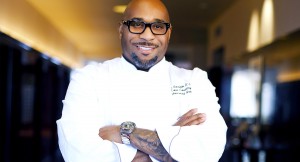 I found that it was the easiest job next to mowing the lawn. As a teenager I learned my way around the kitchen. When I turned 17 I thought it could actually be something serious so that is what I did.
I found that it was the easiest job next to mowing the lawn. As a teenager I learned my way around the kitchen. When I turned 17 I thought it could actually be something serious so that is what I did.
AE: You have cooked meals for some very notable people such as former President Bill Clinton as well as Halle Berry. Do you have any fun stories from those experiences?
GG: The first call I got didn’t come from the White House. It came from someplace that was the lead security of some sort. When I first got the call to do a dinner for President Clinton he was still in office. I just hung up the phone. I thought it wasn’t real. I thought it was a joke. Then I get a call from the guy who set it all up and asked why I hung up on the staff at the White House. I was like I think I did. So that was a funny story, but I ended up doing a really great dinner for the president.
Then you know sitting in the kitchen with Halle Berry and having a glass of wine and making dinner for her is pretty exciting also.
AE: You have been on many TV shows here and there. Take me back to the first time you started your career on TV. What thoughts raced through your mind at that time?
GG: I have always done live TV and special guest spots, but the TV show, “Turn Up the Heat” the very first show I remember going is anyone going to ask me if I know what I am doing because no one ever did. 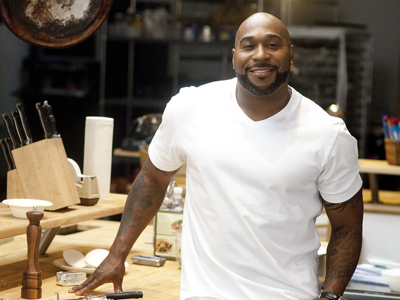 I signed the contract. I never stood in front of a teleprompter before. I never did anything like that before besides being funny.
I signed the contract. I never stood in front of a teleprompter before. I never did anything like that before besides being funny.
I spent some time trying to prefect the business part of television. The rest of it I said that I am going to have some fun. My very first guest was Hill Harper. I called up Hill. I told him that he was on the show tomorrow. I asked him what he was going to wear, what he did or didn’t want to talk about, was he going to stand on my left or my right, and so forth. I thought I would be human about it. It was a really interesting experience.
AE: Which other famous chef or celeb would you like to cook with or have them cook for you?
GG: There are a couple of people that I really like. I don’t know if I would ever get the opportunity to work with them, but Thomas Keller is one of the brilliant minds behind the culinary world. Sidney Poitier. He just represents the human species really well. That is a man that I am impressed with that I would love to cook for.
AE: What is the process like for creating new dishes? Is there a lot of trial and error?
GG: There is a lot of trial and error when you are younger. As you get older and you understand the culinary science of food it gets easier. When I think about a dish I imagine what that dish could be like. I do a lot of thinking before I go into the kitchen. So I spend a lot less time testing and failing, but rather testing and developing. So for me I draw inspiration from whether it is a flower or a fruit or a dish that I saw that can be enhanced. For me it is getting in and really developing the dish.
Aug 4th

Fans Surprise U.S. Men’s National Team
Before the United States Men’s National Team departed for Brazil they received a surprise in Jacksonville following their 2-1 win against Nigeria.
With help from fans across the country and soccer legend/ former USMNT player Brian McBride, Allstate Insurance, sponsor of the USMNT, surprised the US team with a send-off video that was unveiled at EverBank Field.
Their reaction to the send-off is being brought to life in the “Surprise send off for the U.S. Men’s National Team” video (see below), which truly highlights the passion that fans have for the USMNT and soccer.
Jun 16th

Brian McBride Talks World Cup, Allstate Soccer Clinic and More
With the World Cup almost here fans all over the globe are getting excited for soccer. Brazil, Germany, Spain, and Argentina are the four countries who seem to be poised to make it far into the tournament. Still as former U.S. Men’s National Team and MLS legend, Brian McBride says there is always a surprise team in the World Cup that shocks everyone.
McBride knows this because he played in the World Cup in 1998, 2002, and 2006. From playing for Fulham in Europe to the MLS league in the United State McBride has had an outstanding career. Just this year he got inducted to the U.S. Soccer Hall of Fame.
Now McBride has teamed up with Allstate for the “Good Hands F.C.” soccer clinic. They will surprise local soccer teams in a few areas across the country with soccer gear and a coaching clinic run by McBride.
I was able to catch up with Brian to talk about his work with Allstate, the World Cup, and more.
Art Eddy: You are working with Allstate before some of the friendly games that take place before the World Cup. Can you tell me what you are doing with Allstate?
Brian McBride: Yeah. It is two things. I think the first part and the most important and most enjoyable part is that Allstate formed this Good Hands F.C. It is basically this opportunity where I get to go into the community with Allstate and provide a coaching clinic and we hand out some really nice gear. The club that we go to will have new uniforms and new balls. For the most part it is really a great opportunity because these clubs don’t usually have the opportunity to have these things.
It is a really special time. During that time I will put on a special clinic and do some teaching, but it is mostly about 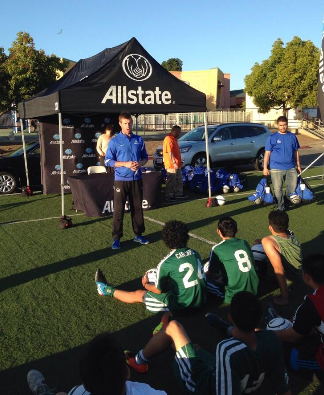 having fun. It is a great few hours.
having fun. It is a great few hours.
AE: Sounds pretty cool. What is the best part about surprising these kids at their practices?
BM: There is no end to the joy of seeing their faces light up and them grasping the fact that they are getting new uniforms. They are getting new backpacks and training suits. It is fun watching them take in the training part of it. That is the coaching side of me, but I think the most enjoyable part is seeing their reaction to when they realize what they are getting.
AE: Switching to the World Cup the buzz from Team USA is that Landon Donovan didn’t make the cut. What is your take on that? Is the media making too much of the fact that Donovan is not on the team?
BM: No, I don’t think you can make too much of it. The nice thing now is that the soccer community is so large and there is so much interest into it now. It was a huge news story. It definitely is something that came as a surprise. It is a big step for Jürgen (Klinsmann). He has shown that he is a bold coach.
For me it wouldn’t be a decision that I would take, but you have to look at the past and he has always had the support of the players. Last year people had their questions, but the players showed their commitment to the team and each other and the coach. I hope it doesn’t become an issue on the field. It is a big statement to leave off a player that I quite frankly wouldn’t have left off.
AE: Who do you feel has the best opportunity to win the World Cup?
BM: For me there are four teams that stand out. There are of course some teams that could pull some surprises, but for me Brazil, Argentina, Germany, and Spain look the strongest. The great thing about a World Cup is usually there is one surprise team. Who will it be? I hope that it is the U.S. That would be awesome, but those four teams I mentioned would be the strongest teams going into this.
AE: What was your favorite World Cup moment as player? 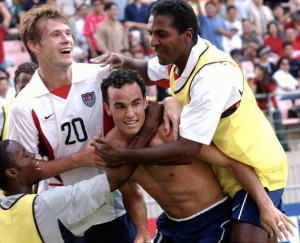
BM: The 2002 World Cup was by far the most memorable and enjoyable period of soccer. We had great results on the field. The team off the field was such a solid group. I was just married. My family was there. My wife and my daughter was there. We were able to spend time together. It was such a perfect situation and scenario.
AE: You were the CONCACAF Gold Cup MVP, Chicago Fire team MVP, and you just got elected into the U.S. Soccer Hall of Fame. Congratulations on that achievement. What stands out the most to you from your great career?
BM: For me I was just so blessed to play the game for so long and to have some great memories. My time in England was just amazing. The chance to get into the fabric of a club like Fulham, be accepted by the fans, and getting a chance to see what soccer is like at the top level were really exciting things. To see a culture that is all about soccer day in and day out and to see fans get excited was great. It is starting to happen here in the states too, but we still have a long way to go.
May 28th

Former US Soccer Star Tony Meola Talks World Cup and More
Even though Tony Meola is retired from soccer he still has a passion for the game. He played on the U.S. Men’s National Team and played in the MLS. He was in three FIFA World Cups and is a member of the National Soccer Hall of Fame. During his time playing in the MLS, Tony was named the league MVP in 2000. That year he and his team the Kansas City Wizards won the MLS Cup title. He now co-hosts a soccer radio show on Sirius/XM Radio called “Counter Attack.”
Meola and I had a chance to chat about his work with Allstate for the “Good Hands” soccer clinic where he surprised a local soccer team by stopping by their practice and giving them a few pointers. We also discussed if he would make any changes to the World Cup.
Art Eddy: Last year around this time you and I had a chance to talk about the great work you were doing with the Allstate “Good Hands F.C.” soccer clinic. Now it looks like you are picking up where you left off from last year. Tell me what you are doing this year?
Tony Meola: We will march in on a practice for some young kids. We look to run a clinic and in the end we will give the team and the coaches everything that they need in order to be successful on the field. Things like training gear, soccer balls, soccer uniforms, shin guards, bags, sweat suits, and everything else that need to run a club.
We also openly invite them to the Allstate fan zone during the United States and Mexico friendly game. We give them tickets to the game. It is a great event. We love seeing the look on their faces when they are finding out that they are going to the game. It is fun to be a part of it.
AE: What are the main things you look to focus in on during the Allstate “Good Hands F.C.” soccer clinic?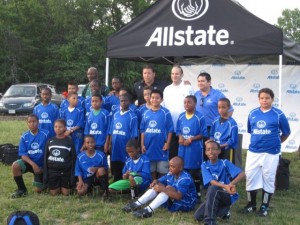
TM: Obviously it is hard to make an impact with just one night of practice. We will kick the ball around a bit. It is more about showing how much Allstate cares about the community. We love to give back with this sponsorship. If they don’t learn any soccer that night or don’t get any better I am okay with that. The vehicle is soccer, but the mission is to make the kids happy. We want to give them something in one night that would not necessarily get.
AE: You must have a blast at these events where you get to teach kids about the sport you love, right?
TM: The end result is always fun. These kids are so appreciative. The coaches who spend all their time and effort and probably send more emails than they really want to. They probably have to deal with more issues than they want to. They don’t get paid, but they are really, really appreciative. It is great to see that they get something that they necessarily wouldn’t have if it wasn’t for the people at Allstate.
AE: How do you think the game of soccer has evolved since you retired from the game?
TM: It has been all positive. It continues to grow. I am now coaching at the youth level. It is great to see all the different age groups improve their game. It was great to see what the 17 year old group did at the recent Nike friendly as well as what they did in the tournament overseas.
I don’t know what more we could ask our youth coaches to do other than to continue in the direction that we are going in right now. The coaches are doing a great job of that. They are putting the time in and showing the kids the passion that they have about the sport. I think the future is bright.
AE: Is there a league or team that you love to watch these days? 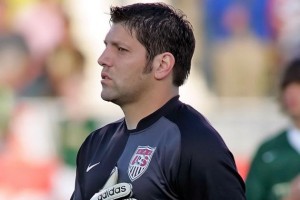
TM: I follow soccer every day. I do that because I am on the radio all day. I like the EPL (English Premier League). I am a fan of La Liga. I love watching the Champions League. There are not a lot of leagues that I don’t like. I love watching the game. I love watching the tactics of the game, the adjustments that are made during halftime, and just studying the game.
AE: Are there any changes you would love to see in the game especially in the World Cup?
TM: No, I am happy with it. Everyone argues what region should have more teams. We respond to it because we have to since it is part of our job, but I don’t get too caught up in it. Instead of complaining about the World Cup I would rather enjoy it. Just enjoy the greatness of the players, the teams, and the passion of the fans.
To me there is nothing negative about the World Cup. Everyone wants to argue all the time, but I try to stay away as much as I can. I just try to enjoy what I am seeing for that month.
Apr 14th

Tamika Catchings Interview
Tamika Catchings is a household name for many basketball fans. The former NCAA champion and WNBA legend has even won gold in the Olympics. Catchings doesn’t just excel on the court. She is a leader in her community and has her own charity called Catch the Stars.
She also assists with the Allstate WBCA Good Works Team program. This campaign nominates 10 college basketball players from all divisions of the sport who participates in community service activities is a well-rounded student-athlete. There were 84 nominations submitted by athletic departments from colleges and universities. Catchings, along with other select voters, will name the final award recipients in February.
Tamika was kind enough to take time from her busy schedule and chat with me about basketball, the Good Works Team, and what she looks to do after the WNBA.
Art Eddy: Recently, you partnered with Allstate and the Women’s Basketball Coaches Association to be part of the WBCA Good Works Team. What has this experience been like for you?
Tameka Catchings: This has been a great partnership. It’s a combination of the things that I believe in with young ladies playing basketball, but most importantly realizing the impact they have off the court in their respective communities and abroad.
AE: The WBCA Good Works Team recognizes student-athletes for their commitment to serving others. What is the process like for these finalists and when will a winner be announced?
TC: These young ladies are selected by their Athletic Directors who send a form talking about the players and a list of all of their charity work. From there, there’s a selection group that goes through each of the nominations.
We eventually have to get the Allstate WBCA Good Works Team down to a total of 10 female student-athletes. Five of the ladies come from a D1 school, and the other five come from D2, D3 and NAIA schools.
AE: Speaking of community service you have your own charity called “Catch the Stars.” Tell me a bit about that program and what inspired you to start that up.
TC: My Catch the Stars Foundation empowers youth to achieve their dreams by providing goal setting programs that promote literacy, fitness and mentoring. We serve boys and girls ages 7 to 16 and offer about 12 different programs throughout the year that tie to our three buckets: literacy, fitness and mentoring.
I was inspired to start it up because of all of the people that came into my life throughout my journey of being a professional basketball player. Everyone played a little or big role in my life, and my goal is to turn around and help these kids realize their dreams and passions as well.
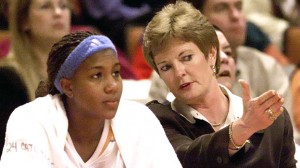 AE: Moving onto the court. You played at the University of Tennessee and won a NCAA National Title there. You played for legendary head coach Pat Summitt. What did you take away the most from Coach Summitt?
AE: Moving onto the court. You played at the University of Tennessee and won a NCAA National Title there. You played for legendary head coach Pat Summitt. What did you take away the most from Coach Summitt?
TC: One of the main things I took away from being under Coach Summitt was just about being great women overall. She didn’t just focus on one aspect, she focused on what we did on the court, what we did off the court, and what we did in our community to help others. That’s another reason why I’m so passionate in helping our youth.
AE: You also won an Olympic Gold medal. What was it like to play for your country and come out on top?
TC: It’s a true blessing and honor to be able to represent the USA. Every time I have an opportunity to play for my country, I think about playing on the highest level and with the best players in the world.
AE: Your success didn’t just end there. In the WNBA you made a name for yourself as a WNBA Champion as well as a WNBA MVP. With all these accolades what keeps the fire burning for you to compete at the pro level? 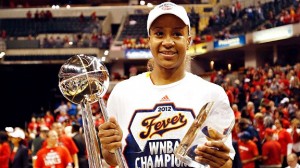
TC: The thing that keeps me burning is that I can be better. When I’m done playing I want to know that I gave everything that I had every time I stepped on the court. As long as I’m playing, I will continue to strive to be better today than I was yesterday.
AE: Reading up on everything you do it seems that you are always on the go. When you do have free time what are you doing to relax?
TC: Free time? What is that? (Laughs) Just kidding. I love being with my family so every day that I’m here in Indianapolis I try to end my day spending time with my little nephews before coming home and hanging with my oldest nephew, he lives with me.
AE: After your pro career is done have you thought about your next goal you want to accomplish? Would you get into coaching?
TC: When I’m finished playing I ultimately want to be a General Manager for a WNBA or NBA Team. I don’t want to coach because I don’t know if I have the patience to do that, but I love the thought of being a GM. I also would love to get married to the man of my dreams and have kids and a family.
Dec 18th

Tony Meola Interview
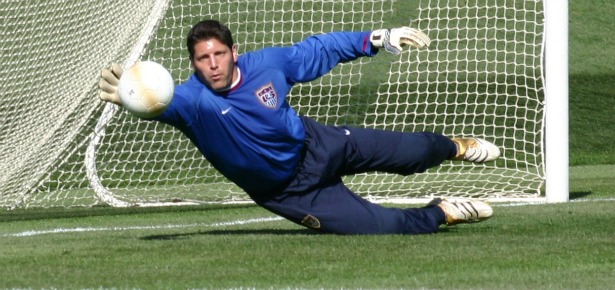
If you’re old enough to remember when the US hosted the 1994 World Cup, you know Tony Meola. The former US National Team goalkeeper made 100 appearances for the national squad between 1988 and 2006. Born and raised in Jersey, Meola and his larger-than-life mulleted/ponytailed persona was one of the first true soccer superstars in the States.
Meola was a foundational stud who helped launch Major League Soccer in the US. He’s an Italian-American who grew up loving soccer (his pops Vincent played reserve fullback for a second division team in Italy), but Tony also excelled in basketball and baseball. Dude was even drafted by the Yankees. Meola is an engaging guy. He has an awesome radio show called Counter Attack Radio and he also plays the drums.
I caught up with Tony last week when he was in Denver on March 21 when he surprised members of the Future Soccer Academy by hosting an Allstate “Good Hands F.C.” Clinic that included free gear and tickets to the US v. Costa Rica blizzard match that took place on March 22. Tony and I discussed the Allstate Clinic future prospects of the USMNT, racism in soccer, the fact that all goalies are a little bit nuts, the ‘94 World Cup, the birth of the MLS, drummers and a whole lot more. Here’s the interview:
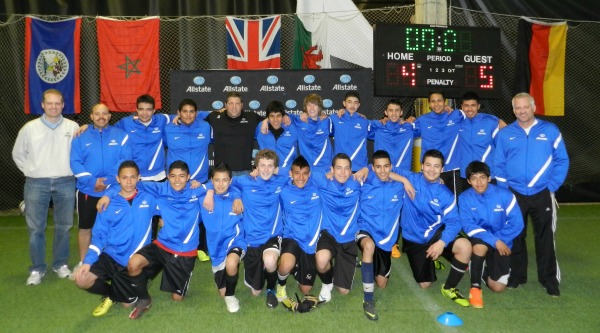
CS: So let’s start with the Allstate Good Hands FC Clinic. Tell me what that’s all about.
TM: Yeah. So Allstate is in their third year of sponsorship with both Major League Soccer and the US National Team. We get to go around the country. I’ve been with the program all three years now. Essentially what we do is the night before a game, we go into the community and we barge in on a practice, which has all been set up through the coaches. We give them a clinic and then ultimately we do some shootouts and we give some prices away and all that kind of stuff. And then at the end everyone comes in and everyone gets a gift from Allstate which is a bag with basically everything that they need for the upcoming season. Literally it’s a group that’s in maybe a little bit more need than some other groups for uniforms, sweat suits, soccer balls, training gear for the coaches. Ultimately, at the end, they’re given tickets to tomorrow night’s game. And in this case, it’s the US-Costa Rica game.
CS: Oh nice. That sounds cool.
TM: Yeah it’s really cool. It’s a really cool night. Allstate does a great job.
CS: So why aren’t there more youth academies in the US? Whether they be from MLS teams or the National Team. You see places in Europe where every club and country has some type of academy where they train these young players. We have such a strong youth soccer culture, but we don’t necessarily put a lot of investment into that development and bringing them forward.
TM: We have 100 academies in the country. All MLS teams have them now, as of finals last year. Major League Soccer has committed above and beyond what the club teams are required to commit to the programs now. It has committed upwards of 20 million dollars to the program. One of the primary focuses is to continue to develop youth soccer players. That’s the only way we’re going to continue to grow in this country.
People started screaming about it a couple years ago when they put the academy program in, but it’s not something that is going to happen overnight. It’s not something that was considered their first priority when they put the league together, but it’s certainly a priority right now. It’s going to take a little bit of time to implement it fully, but from what I’ve seen, everybody is taking steps in the right direction.
CS: You were a foundational contributor to the whole birth of Major League Soccer in ’96. How do you think the league has progressed since then and can they do more to gain exposure and increase popularity?
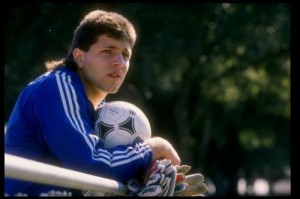 TM: Well certainly there is more exposure, much more exposure. Social media now exists, which certainly didn’t when we started. That’s huge. The television deals that they have are different than the deals we had, you know? So it continues to grow, and that was the goal for everybody. First we had to figure out, how do we grow it in the right way. And then once we had, do we have the resources to grow? Is there the funding in US Soccer to grow it? And they’ve come about on all of these things. Do I think it’s the end of the growth? No, I think there’s still so much more. And I think everyone agrees that there’s still a ways to go, but I also think everybody is happy with the direction that it’s going.
TM: Well certainly there is more exposure, much more exposure. Social media now exists, which certainly didn’t when we started. That’s huge. The television deals that they have are different than the deals we had, you know? So it continues to grow, and that was the goal for everybody. First we had to figure out, how do we grow it in the right way. And then once we had, do we have the resources to grow? Is there the funding in US Soccer to grow it? And they’ve come about on all of these things. Do I think it’s the end of the growth? No, I think there’s still so much more. And I think everyone agrees that there’s still a ways to go, but I also think everybody is happy with the direction that it’s going.
CS: So if we started to see things like time outs or commercials in soccer, do you think that would attract more advertising dollars and maybe help make the sport more popular and viewable if it had more of that TV exposure?
TM: Good question. It attracts so many different ways to advertise, in soccer. The problem with our sport, and I don’t think we’re going to start it here in America, is it’s 45 minutes of running. That’s the one part of the game nobody wants to see change.
CS: Right.
TM: Everyone wants that to flow. From a coaching standpoint, I’m sure a coach wants to have the ability a couple times to have a time out and make some changes, but that’s the beauty. Coaches get one chance to make things right and that’s halftime. Of course they can make some substitutions along the way, but that’s their one time where they can put their imprint on the game.
CS: You were a key member of the ’94 World Cup team that really helped advance the game in the States. What’s your fondest memory of that whole US World Cup experience?
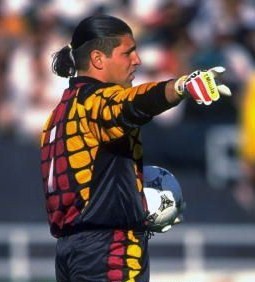 TM: I think the unity of that team. In ’94, I mean we had half the team that played in Europe and half the team that played in the United States. When we got together, the cause was always the same and we knew how important it was. They know how important it is here as well, but we had heard for four years that if we didn’t qualify in 1990, they were going to take the ’94 World Cup away and we knew it was a privilege for us to have it in our country. We understood it and we played as such. Every minute was important to us. Every second we were together was important to us. That’s what I remember about that group. That was never something you had to worry about.
TM: I think the unity of that team. In ’94, I mean we had half the team that played in Europe and half the team that played in the United States. When we got together, the cause was always the same and we knew how important it was. They know how important it is here as well, but we had heard for four years that if we didn’t qualify in 1990, they were going to take the ’94 World Cup away and we knew it was a privilege for us to have it in our country. We understood it and we played as such. Every minute was important to us. Every second we were together was important to us. That’s what I remember about that group. That was never something you had to worry about.
CS: Do you think the USA will win a World Cup in your lifetime?
TM: I sure hope so. It’s hard to say. Even if you take Brazil or Germany or Italy, it’s hard to say if any of those teams will win another World Cup from here on out, in my lifetime. It’s just so difficult to win. There have only been eight or nine countries that have won the World Cup and there’s a reason for that. But I certainly hope so. And we’ve had teams that could compete, the team in 2002, the team in 2010, could all compete with anybody in the world. But you know, you have to get the job done on that day. I’d like to think the answer is a solid yes, but I can’t give you a solid yes.
CS: I gotcha. Do you like what Jurgen is doing with the direction of the National Squad? What do you think the program has to do to take the next step in the international stage?
TM: When I think about Jurgen, for me, he’s going to be –and I say this all the time– he’s going to be judged, and should be judged, on the results.
CS: Right.
TM: Right now he’s under a little bit of pressure. Which, one, I think is good because it shows that people care. If no one cares you never have any pressure. My concern is that sometimes, from reading the federation, he changes the whole program. For me I’d like his concern just to be strictly on the National Team qualifying for the World Cup and progressing that way. Let everybody else worry about development below the national team. As far as the system, I don’t know that the system has changed all that much, if any. I still think it’s about results. That’s what people want to see. With these World Cup qualifiers it’s just vitally important.
CS: The US has such a great track record of producing quality goalies, but it seems that producing that same level of skill with players in other positions has proven a bit more difficult. Why do you think that is?
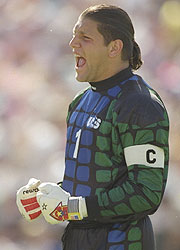 TM: Well it’s an athletic position. I think it’s one of coordination. Our guys generally grew up playing baseball, playing basketball as well as soccer, and are a little bit more well-rounded. Because it’s an athletic position, they can pick it up a lot quicker. We used to have foreigners on our team in multiple positions and we’d play a simple game like basketball or handball and you could tell that their eye-hand coordination was zero. Our field players even, they were good playing basketball, baseball, or whatever else we were playing. So we grew up playing multiple sports, I think it’s good. Eventually you’ve got to concentrate on one to make it to that level, but for the most part I think that’s what’s up with the goal keeping position.
TM: Well it’s an athletic position. I think it’s one of coordination. Our guys generally grew up playing baseball, playing basketball as well as soccer, and are a little bit more well-rounded. Because it’s an athletic position, they can pick it up a lot quicker. We used to have foreigners on our team in multiple positions and we’d play a simple game like basketball or handball and you could tell that their eye-hand coordination was zero. Our field players even, they were good playing basketball, baseball, or whatever else we were playing. So we grew up playing multiple sports, I think it’s good. Eventually you’ve got to concentrate on one to make it to that level, but for the most part I think that’s what’s up with the goal keeping position.
CS: So why did you choose soccer over baseball and basketball? You were pretty accomplished at both. I mean you were drafted by the Yankees, man. What made you gravitate toward the soccer field?
TM: My goal as a kid was to play in a World Cup. I grew up watching Italy, because of my background and watching Dino Zoff in the 1980 World Cup in goal. That was what I wanted to do, unlike most kids, especially in that era. Now it’s probably not so uncommon to have kids dream of playing in a World Cup, but back then it probably was your second or third choice. For me it was just the thing I wanted to do more than anything, and I was lucky enough to be able to live that dream.
CS: Do you think all goal keepers are just a little bit nuts?
TM: (laughs) It would be hard for me to disagree with you.
CS: (laughs) Nice.
TM: I don’t know if that’s before, during, or after the job. I’m not so sure.
CS: Do you think you could currently help the New York Jets win some games?
TM: No.
CS: (laughs).
TM: (laughs) I don’t think so. I think the range has diminished a little bit, but I still think from 45 yards in I’d be alright.
CS: I know you’re a pretty accomplished drummer, who is your favorite drummer of all time?
TM: I would say Neil Peart from Rush. Just like you always try to be like someone you’re never going to be able to be like. Carter Beuford from Dave Matthews Band. Guys like that. Guys that you can just tell are really good at having fun at what they do.
CS: What do you think can be done about the whole racism in soccer situation? It seems to be pretty rampant and kind of a growing problem.
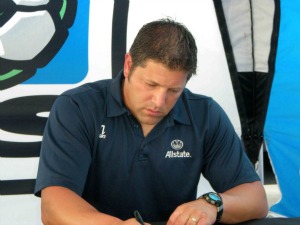 TM: Yeah, unfortunately it is. We have this discussion on our show, it seems like weekly. And it seems like, for whatever reason, in these last couple months it has come to the forefront again. Fortunately we don’t have a lot of it here in the United States. I think we’ve had so much education in the United States, dating back so many years, that kind of helps us. Kids are learning about it in school. I’m not sure what the education is at a young age overseas, but yeah, it’s got to stop. It’s sickening every time I hear about it and every time we have to talk about it. We talk about the same thing, when is it going to end? When are people going to learn? When are they going to stop being so cruel to each other? But some people just don’t get it. They just don’t get it. And the scary part is we have guys on our show that have played 20 years ago, played overseas in different places, they’ll come out and talk about how bad it is now. They’ll give us horror stories about how much worse it was when they were playing. Any offence in that regard is disgusting to me, but to listen to some of the stories they tell, it just blows my mind.
TM: Yeah, unfortunately it is. We have this discussion on our show, it seems like weekly. And it seems like, for whatever reason, in these last couple months it has come to the forefront again. Fortunately we don’t have a lot of it here in the United States. I think we’ve had so much education in the United States, dating back so many years, that kind of helps us. Kids are learning about it in school. I’m not sure what the education is at a young age overseas, but yeah, it’s got to stop. It’s sickening every time I hear about it and every time we have to talk about it. We talk about the same thing, when is it going to end? When are people going to learn? When are they going to stop being so cruel to each other? But some people just don’t get it. They just don’t get it. And the scary part is we have guys on our show that have played 20 years ago, played overseas in different places, they’ll come out and talk about how bad it is now. They’ll give us horror stories about how much worse it was when they were playing. Any offence in that regard is disgusting to me, but to listen to some of the stories they tell, it just blows my mind.
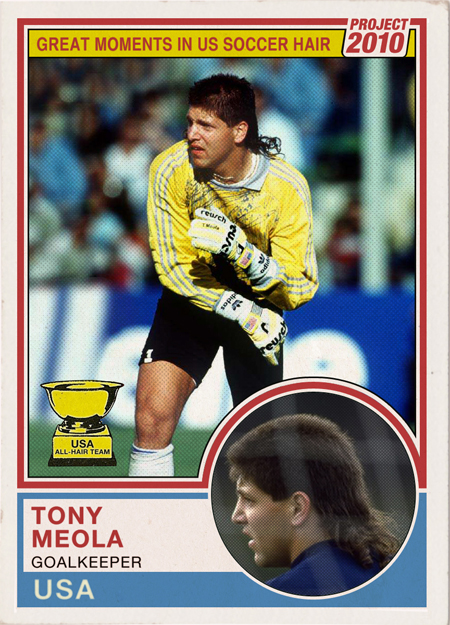 CS: Last question for you. I’ll try to end it on a little bit of a lighter note here. Do you think ponytails will ever make a comeback on the pitch?
CS: Last question for you. I’ll try to end it on a little bit of a lighter note here. Do you think ponytails will ever make a comeback on the pitch?
TM: Oh, that would be my dream.
CS: (laughs)
TM: Even more than the prettier ponytail, would be if the mullet came back.
CS: Oh, that might be asking too much (laughs).
TM: That might be, but hell, bell bottom pants came back for a little, right?
CS: Anything is possible (laughs).
TM: (laughs). Maybe one day. Maybe one day…
Mar 28th

Hall Of Famer Richard Dent Talks About Hometown Hall of Famers Program
Richard Dent, former NFL defensive end and Atlanta football legend, will be honored in his hometown community as part of a special program called “Hometown Hall of Famers” presented by the Pro Football Hall of Fame and Allstate.”
Dent will be recognized by representatives of the Pro Football Hall of Fame, Allstate Insurance Company and the Atlanta community during a special ceremony at Crim Open Campus High School. The event will take place Wednesday, March 27.
The four-time Pro Bowl honoree was named Super Bowl MVP for his dominating performance against the New England Patriots in the Bears’ decisive 46-10 victory in Super Bowl XX. Dent was inducted into the Pro Football Hall of Fame in 2011.
Art Eddy: You are being honored in Atlanta for the “Hometown Hall of Famers” program presented by the Pro Football Hall of Fame and Allstate this week. How did it feel when you heard the news about this great honor?
Richard Dent: It is a great honor. When members of the Pro Football Hall of Fame and Allstate come together to help people like myself go back into the community and say thanks to your neighborhood and places where you grew up it is a great feeling.
There is going to be a bunch of kids from the Atlanta school systems there and the message will be that you should strive to find yourself. For me I didn’t play sports in high school until my junior year. I was able to go to college on a scholarship and go play in the National Football League. If you play at a certain level you might be able to make it into the Hall of Fame. I never really thought about that, but did dream about going to the Super Bowl and winning it. Had a chance to see those things happen.
Now Allstate and the Hall of Fame have allowed me to get on the road and get into the communities and tell these stories. I am able to thank those who were able shape young men in the community like me. 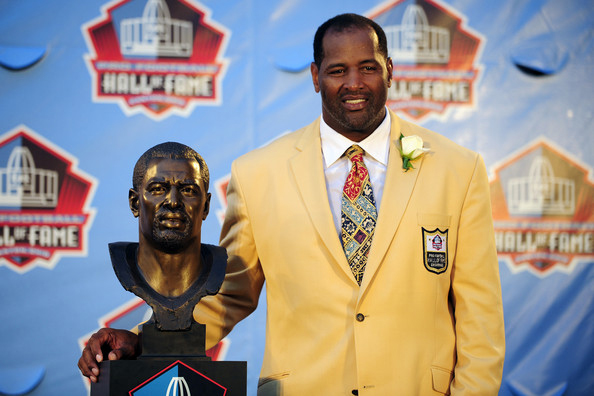
AE: Henry Adams, who is one of your former coaches, will present you with the historic plaque. Talk to me about your relationship with your former coach.
RD: He was the defensive coordinator and Coach William Lester, who was the head coach, would have probably introduced me into the Hall of Fame, but he has passed. I had a chance to thank him at the Georgia Hall of Fame. William Lester has had touched so many thousands of students that went to college.
Henry Adams was the head coach of the basketball team. He made me be the water boy for one year. Then I played my senior year and made All-State. I thought I had something there and didn’t really think about football too much. William Lester help me stay at Mercy High School when my family moved out of the community. He would give me rides to and from school for two years.
It just goes to show you what people would do for you if you put a flag in the ground and work at a goal and find yourself. I wanted to be someone in my community and be looked up to. My family appreciated that. This is why I appreciate Allstate and the Pro Football Hall of Fame to come back and say thanks to some people. Plus if you can save some lives by what you say and they envision theirs lives on what they can be it is a good thing.
AE: You were part of the great 46 Chicago Bears defense with Mike Singletary, William Perry, Wilber Marshall and many others. What was it like to play with those guys?
RD: When I look back it was me, Dan Hampton, William Perry, Walter Payton, and Mike Singletary. I think we had probably seven to eight Hall of Famers on that team. When you have all those guys in life just like in football you can reach your goals. We should have been the first team in the NFL to win three Super Bowls in a row. In four years we only lost ten games.
If you look at all the dominant teams in the NFL from decade to decade it would be hard to find a team to match what we did in those four years. It just goes to show you how tough it is to accomplish what we did.
AE: In the 1985 season you guys were so close to going undefeated and match the record of the ’72 Miami Dolphins. Ironically enough it was the Dolphins who were the only team to beat you that year. At that time did you guys care about that or just focused on winning the Super Bowl?
RD: When we lost the Championship game the year before to San Francisco we vowed to each other on the plane ride back that we were going to win everything hands down. We didn’t say we were going to go undefeated. The first game of the year we were down 21 points at halftime. That was Tampa Bay.
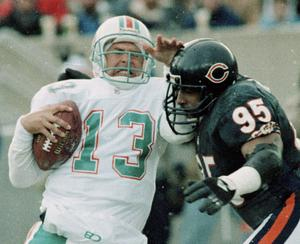 We had a conversation at halftime and we came back to win that game. In Week 13 we faced the Dolphins and we looked at the calendar and thought this was going to be the team to beat since everyone else was kind of mediocre. We lost that game got back home around 2:30 in the morning. We woke up about 12 the next day and went to the studio to record “The Super Bowl Shuffle.”
We had a conversation at halftime and we came back to win that game. In Week 13 we faced the Dolphins and we looked at the calendar and thought this was going to be the team to beat since everyone else was kind of mediocre. We lost that game got back home around 2:30 in the morning. We woke up about 12 the next day and went to the studio to record “The Super Bowl Shuffle.”
We were like so what we lost. We will see those guys down the road. If they do their thing we will see them in the big game. We were looking for them. I am glad we didn’t see them because Dan Marino is a good friend of mine. I would have hated to put on Dan what I wanted to do to him. If he showed up it wouldn’t have been a nice day.
AE: Speaking of Super Bowl XX you guys beat up on the New England Patriots and you took home the MVP trophy. I am guessing 1985 was a great year for you.
RD: Yea it was a great year for me. That was my first award I received for a particular thing I did in a season. I led the league the year before and lead the league that year and I didn’t get anything for it. So for me it was my first award. I was really honored to win that MVP award in the Super Bowl.
AE: After playing with the Bears, you played with the 49ers, Colts, and Eagles. You even won another Super Bowl ring with the 49ers. How was it for you to adjust to playing for those different teams?
RD: No it wasn’t for me. God gave me the physical abilities to play football. You go out and give your best each week. Sometimes there are people who talk about their play and don’t match it with their performance on the field. That was the tough part. You try to work with people and tell them that where there is a will there is a way.
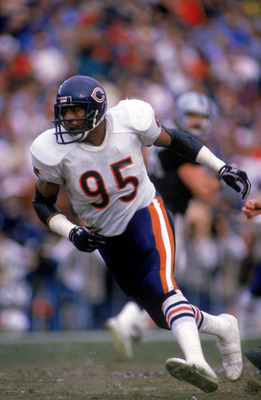 AE: You also were one of the all-time greats in the NFL for sacking quarterbacks. You at times made it look very easy. What was the secret to your success?
AE: You also were one of the all-time greats in the NFL for sacking quarterbacks. You at times made it look very easy. What was the secret to your success?
RD: Well I am a geek when it comes down to technology and tendencies and data. I would break a person down in about 15 minutes. The point is your ability can go to a certain extent. Your talent can go anywhere you want it to go. You look and listen and you start to know what you need to do.
You might be able to take those tendencies from a player and know about 80 percent of what they are going to do. So I don’t have to run crazy. For me when I start moving I am looking at 80 percent of what could take place and I’ll fight for the other 20 percent. You start to have fun during the game because you most likely know what will happen. That gives you longevity. If you are out there bouncing around and running around at some point the game catches up with you.
Everybody can play, but what level can you play at? That is the key for me to be the best you can be.
Mar 26th
